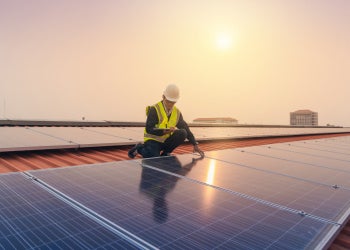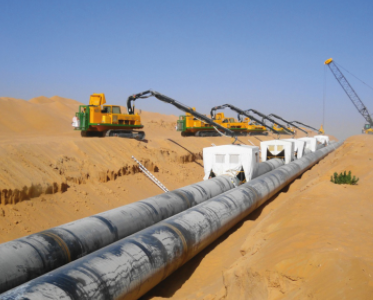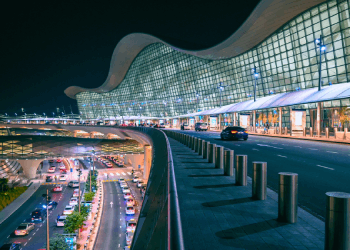Cop28 must deliver on promises
25 October 2023
 Commentary
Commentary
Jennifer Aguinaldo
Energy & technology editor

There is a good chance that the average delegate attending the 2023 Conference of the Parties of the UN Framework Convention on Climate Change (Cop28) will skip visiting or driving past the key clean energy installations in the UAE.
These include the wind turbines on Sir Baniyas Island, 9.5 kilometres (km) off Jebel Dhana in Abu Dhabi; the $29bn Barakah nuclear power plant in Al-Gharbia, close to the border with Saudi Arabia; the solar farms in Sweihan and Al-Dhafra in Abu Dhabi; and Dubai’s Mohammed bin Rashid al-Maktoum Solar Park, 50km from Expo City, the venue for Cop28.
For many delegates, a trip to these sites is unnecessary. They are aware of the UAE’s green credentials, with the country having ploughed billions of dollars into investments aimed at decarbonising its economy, and more still to come.
For others, however, a single statistic undermines the positive environmental steps that the world’s sixth-largest crude exporter has taken. State-backed energy firm Abu Dhabi National Oil Company (Adnoc) plans to increase its oil production capacity from 4 million barrels a day (b/d) to 5 million b/d by 2027.
Double-edged strategy
Critics, who include the head of the Catholic Church, Pope Francis, have warned of the dangers of a double-edged energy transition strategy. Cop28 president-designate Sultan al-Jaber, managing director and CEO of Adnoc, prefers to describe such an approach as pragmatic.
An agreement requiring developed countries to provide loss and damage funding to countries most affected by climate change was a key takeaway from last year’s UN climate change conference in Egypt (Cop27). However, there was a lack of progress on the phasing down or out of fossil fuels.
The onus is now on the UAE, whose energy transition approach embraces energy sources from fossil fuels to green hydrogen, to deliver a more productive conference.
The hope is that the UAE’s status as an oil- exporting country, and the selection of an oil industry stalwart to lead this year’s negotiations, will not distract from the important tasks that the 12-day event aims to tackle.
Cop28 will see the first global stocktake of the progress countries have made towards their emissions reduction commitments or nationally determined contributions (NDCs).
Al-Jaber has also promised to supercharge climate finance and put more pressure on developed countries to fulfil the commitment they made at Cop15 in Copenhagen to mobilise $100bn annually by 2020. This target has been missed repeatedly.
A UAE finance initiative that will provide $4.5bn to help unlock Africa’s clean energy potential was announced in early September and is an example of such commitment.
Al-Jaber’s insistence on putting oil and gas companies at the heart of the climate dialogue is proving both decisive and divisive, however, depending on which side of the climate debate one supports.
“This is your opportunity to show the world that, in fact, you are central to the solution,” he told the oil and gas-dominated Adipec conference held in Abu Dhabi on 2-5 October.
How can green ammonia compete with grey ammonia if the gas for the grey ammonia is provided at a fraction of world market prices?
Cornelius Matthes, Dii Desert Energy
Cyril Widdershoven, global energy market analyst at Netherlands-based consultancy Verocy, supports Al-Jaber’s views.
“The main Cop28 outcome will be linked to an even and rational transition from hydrocarbons to renewables, taking into account the overall need to cut emissions and [carbon] footprint,” he says.
The summit will lead to a realisation that hydrocarbons will be a major part of the overall energy scene for decades to come, as the world is not yet ready to be fully electrified, Widdershoven adds.
The oil and gas industry’s increased presence at, and participation in, Cop28 is expected to make an impact.
“There will be huge pressure on the oil and gas industry to participate in the decarbonisation of energy systems, first by eliminating methane flaring and then eliminating emissions from their own operations by 2030,” says Paddy Padmanathan, co-founder and vice-chairman of clean energy firm Zhero and former CEO of Saudi utility developer Acwa Power.
“Abu Dhabi can influence the national oil companies to sign up to this, and Adnoc and Saudi Aramco should be able to influence the international oil companies to sign up.”
 Top 10 UAE clean energy projects
Top 10 UAE clean energy projects
Walking the talk
The UAE has shown leadership by being the first country in the Middle East and North Africa (Mena) region to initiate the phasing out of fossil fuel subsidies in 2015, Cornelius Matthes, CEO of Dubai-based Dii Desert Energy, tells MEED.
“It was also the first Mena country to introduce a net-zero 2050 target in 2021, and has an unparalleled track record in building some of the largest solar plants in the world at record-low prices.”
Since other countries in the region have already followed the UAE’s lead, the expectation is for Cop28 to provide impetus for similar initiatives to accelerate.
With Abu Dhabi leading, Zhero’s Padmanathan expects it will also be possible to secure financial commitments
to the Loss & Damage Fund that was established at Cop27.
A declaration from the world’s 46 least-developed countries cited a “strong outcome operationalising the new Loss & Damage Fund” among their key expectations and priorities for Cop28.
Home to more than 14 per cent of the world’s population, these countries contribute about 1 per cent of emissions from fossil fuels and industrial processes and most are on the front line of the climate crisis. The majority need funds to deal with the impact of climate change in sectors such as agriculture, while others require funds to develop clean energy sources.
Tripling initiative
The goal of tripling global renewable energy capacity is expected be included in the agenda for Cop28.
This is in line with the International Energy Agency’s recommendation that the world needs to triple global renewable energy capacity by 2030 if the 1.5 degrees Celsius cap on global warming that was agreed in Paris in 2015 is to still be within reach.
However, this goal needs a clear mechanism to be effective, according to an expert in the renewable energy field.
“There will be a big song and dance around the commitment to tripling solar and wind deployment by 2030, but given there will be no mechanism for holding anyone responsible for it, and for sure there will be no consequence … I cannot see how meaningful such pledges can be,” the expert tells MEED.
Hard issues
The wider Mena region, which will share the spotlight and scrutiny associated with Cop28, will have to demonstrate a willingness to talk about the reduction of all harmful emissions, not only carbon, says Matthes.
The easiest option is to phase out fossil fuel subsidies, as they encourage energy waste and profit wealthy populations disproportionately.
“How can green ammonia compete with grey ammonia if the gas for the grey ammonia is provided at a fraction of world market prices?” Matthes asks.
Introducing a cost for all harmful emissions is another opportunity that can automatically improve bankability for energy transformation projects. To their credit, the UAE and Saudi Arabia have recently introduced voluntary carbon markets, which are seen as steps in the right direction.
Initiatives to boost energy efficiency across the Mena region should also be part of the conversation. These range from efforts to use air conditioning, cooling and water more discriminatingly; electrify transportation; deploy battery energy storage systems; and increase the decarbonisation of the production, shipping, refining and upstream use of oil and gas.
“The region’s waste of energy should be reduced and eliminated before even thinking about how to produce energy,” says Matthes.
Possible scenarios
Despite promises of inclusivity and productiveness, there is a strong probability that most Cop28 negotiators will get only a fraction of what they hope to take away from the summit.
“In a complex system like the Cop negotiations, we need to be realistic about what can be achieved,” says Matthes. “As we have seen in the past ... the same countries always manage to dilute compromises and block long-overdue and necessary developments.”
A likely post-Cop28 scenario could include an agreement requiring the oil and gas industry to do and spend more to decarbonise their products and operations, share in the financial burden of climate change mitigation, and if possible, curb production. This could avoid the use of wording that proved contentious at Glasgow’s Cop26 when a deal that called for the “phase out” of coal-fired power had to be amended to “phase down” following pressure from some countries.
Climate change advocates will have to live with the fact that fossil fuels, and their entire supply chain, are not likely to be penalised further or disappear. Major change is unlikely until the world is ready to be fully electrified, or until the fear that halting oil production could cause energy insecurity and economic chaos can be overcome.
The Global North countries will have to weigh the best options to reach their net-zero carbon emission targets by 2050 without risking their economic growth. However, countries such as the UK are in the process of pushing back some of their energy transition targets.
Meanwhile, most Global South countries will continue to bear the brunt of the worsening climate crisis, albeit with some support from top carbon-emitting and wealthy nations.
Rightly or wrongly, this could highlight the merit of Al-Jaber’s preferred pragmatic and inclusive approach to Cop28 in terms of technologies, fuels and the representation of sectors.
“A convergence of interests and the dramatic changes to the status of the global energy transition over the past few years … could help countries find new momentum and solutions that might not have seemed feasible in the past,” says Matthes.
Image: Cop28 president-designate Sultan al-Jaber engages with Pope Francis on driving positive outcomes for climate action. Credit: Cop28
Exclusive from Meed
-
 Egypt tenders 500MW solar IPP
Egypt tenders 500MW solar IPP19 February 2026
-
 Local contractor wins $143m Jeddah sewage contracts
Local contractor wins $143m Jeddah sewage contracts19 February 2026
-
 Saudi Arabia prequalifies firms for gas transmission grids
Saudi Arabia prequalifies firms for gas transmission grids19 February 2026
-
 Consultants bid for Abu Dhabi airport delivery partner role
Consultants bid for Abu Dhabi airport delivery partner role19 February 2026
-
 Qatari firm wins Damascus airport MEP works
Qatari firm wins Damascus airport MEP works19 February 2026
All of this is only 1% of what MEED.com has to offer
Subscribe now and unlock all the 153,671 articles on MEED.com
- All the latest news, data, and market intelligence across MENA at your fingerprints
- First-hand updates and inside information on projects, clients and competitors that matter to you
- 20 years' archive of information, data, and news for you to access at your convenience
- Strategize to succeed and minimise risks with timely analysis of current and future market trends

Related Articles
-
 Egypt tenders 500MW solar IPP
Egypt tenders 500MW solar IPP19 February 2026
Register for MEED’s 14-day trial access
Egyptian Electricity Transmission Company (EETC) has issued a request for qualifications for a 500MW solar photovoltaic (PV) independent power producer project in Egypt’s West of Nile area.
The bid submission deadline is 11 May.
The project is being supported by the European Bank for Reconstruction & Development and will be developed under a build-own-operate model.
Developers will be responsible for designing, financing, constructing, owning and operating the plant, with EETC acting as the offtaker for generated electricity.
US/India-based Synergy Consulting is acting as lead, financial and commercial advisor for this transaction.
The project forms part of Egypt’s strategy to strengthen long-term electricity supply and increase renewable generation capacity.
Egypt is targeting 42% renewable energy in its power mix by 2030. The country aims to raise this share to 65% by 2040.
EETC previously had plans to build a 200MW solar plant in a west Nile area but cancelled the tender for the project in 2020.
Egypt's power sector had its strongest year in over a decade last year, accounting for $4.2bn of total contract awards.
Despite dipping from the previous year, solar accounted for about $1bn of total awards.
In November, a consortium of local firms Hassan Allam Utilities and Infinity Power won contracts to develop two solar PV projects with a combined capacity of 1,200MW, supported by 720 megawatt-hours (MWh) of battery storage.
The UAE’s Amea Power and Japan’s Kyuden International Corporation also recently reached financial close on a $700m project comprising a 1,000MW solar plant and 600MWh battery system in Aswan.
The scheme is backed by a $570m debt package led by the International Finance Corporation and is expected to become Africa’s largest single-asset solar and storage facility when it enters operation later this year.
https://image.digitalinsightresearch.in/uploads/NewsArticle/15701778/main.jpg -
 Local contractor wins $143m Jeddah sewage contracts
Local contractor wins $143m Jeddah sewage contracts19 February 2026
Register for MEED’s 14-day trial access
Saudi Arabia’s National Water Company (NWC) has awarded two sewage network contracts worth a combined SR536.3m ($143m) to local contractor Civil Works Company.
The projects will be implemented over 32 months from site handover and will serve northern Jeddah districts.
The first contract, valued at SR278.5m ($74.3m), covers incomplete main lines and secondary sewage networks serving parts of the Al-Bashair, Al-Asala and Al-Falah neighbourhoods.
The scope includes pipelines ranging from 200mm to 800mm in diameter with a total length of about 54.8 kilometres (km).
The package also includes sewage tunnels with diameters ranging from 600mm to 1,800mm and a total length of approximately 6.5km. Works will also serve the Taybah, Abhar Al-Shamaliyah and Al-Hamdaniyah districts.
The second contract is valued at SR257.8m ($68.8m). It covers the implementation of main lines and sub-networks to serve part of the Al-Hamdaniya neighbourhood.
The works include pipelines ranging from 200mm to 1,500mm in diameter with a total length of about 78.5km. The scope also includes horizontal drilling works for sewage tunnels with diameters from 1,200mm to 1,400mm and a total length of approximately 205 metres.
https://image.digitalinsightresearch.in/uploads/NewsArticle/15699620/main.jpg -
 Saudi Arabia prequalifies firms for gas transmission grids
Saudi Arabia prequalifies firms for gas transmission grids19 February 2026
Register for MEED’s 14-day trial access
Saudi Arabia's Energy Ministry has prequalified companies to develop natural gas distribution networks in five industrial cities in the kingdom on a build-own-operate (BOO) basis.
The industrial zones earmarked are Al-Kharj Industrial City; Sudair City for Industry and Business; and the First, Second and Third Industrial Cities in Jeddah, the Energy Ministry said in a statement.
The contractors prequalified to bid for the natural gas transmission grids BOO scheme include eight standalone firms and seven consortiums:
- East Gas (Egypt)
- Natural Gas Distribution Company (Saudi Arabia)
- Egyptian Kuwaiti Advanced Operation and Maintenance (Saudi Arabia)
- Modern Gas (Egypt)
- Saab Energy Solutions (Saudi Arabia)
- Sergas Contracting (Saudi Arabia)
- Bharat Petroleum Corporation (India)
- UniGas Arabia (Saudi Arabia)
- Best Gas Carrier / Khazeen / Mubadra (Saudi Arabia)
- Al Sharif Contracting (Saudi Arabia) / Anton Oilfield Services Group (China) China Oil and Gas Group
- Hulul (owned by Saudi Arabia’s National Gas and Industrialization Company) /Al-Fanar Gas Group (UAE)
- Indraprastha Gas (India) / Masah Contracting (Saudi Arabia)
- Expertise Contracting / PGL Pipelines (UK)
- National Gas Company (Egypt) / Egypt Gas (Egypt)
- Taqa Arabia (Egypt) / Taqa Group (UAE)
The Energy Ministry has set a deadline of 23 April for these prequalified contractors to submit technical bids.
The ministry added in its statement that it has identified a total of 36 industrial cities in Saudi Arabia for gas infrastructure development.
https://image.digitalinsightresearch.in/uploads/NewsArticle/15699582/main0334.png -
 Consultants bid for Abu Dhabi airport delivery partner role
Consultants bid for Abu Dhabi airport delivery partner role19 February 2026

Abu Dhabi Airports Company (Adac) received bids from major international firms on 19 January for a contract covering the delivery partner role for the upcoming packages at Zayed International airport (AUH).
The project is part of the AUH satellite terminal programme, estimated at AED10bn ($2.7bn).
MEED understands that the following firms have submitted bids:
- Aecom (US)
- AtkinsRealis/Egis/Mace (Canada/France/UK)
- Bechtel (US)
- Hill International (US)
- Jacobs / Surbana Jurong (US/Singapore)
- Parsons Corporation / Arup (US/UK)
The plan includes a new satellite concourse east of Terminal A, linked by an underground tunnel housing both an automated people mover and a baggage handling system.
It also includes apron stands, taxi lanes and taxiways, East Midfield landside access and utilities, additional bus gates and the reconfiguration of the North and South aprons and Apron 6.
The latest tendering activity follows the start of construction works on the East Midfield cargo terminal located at AUH, as MEED reported in December 2024.
Local firm Raq Contracting is undertaking the construction works on this project.
The terminal will cover an area of 90,000 square metres and will have the capacity to handle about 1.5 million tonnes of cargo annually.
The project is part of a broader plan to enhance the new airport's profile.
Abu Dhabi opened a new passenger terminal in November 2023 as part of the airport’s plan to increase its passenger traffic in line with the UAE’s wider growth plans, along with projects such as the rail network being built by Etihad Rail.
In May 2024, MEED reported that AUH's new Terminal A could connect to the Etihad Rail network in the future, as part of its growth and interconnectivity plans.
Plans are in progress to link the new terminal at AUH to the UAE’s growing rail network, according to the CEO of Adac.
Speaking to UK analytic firm GlobalData's Airport Technology during a tour of the new Terminal A at AUH, CEO Elena Sorlini said that Abu Dhabi Aviation is planning to improve the transport links to the site.
https://image.digitalinsightresearch.in/uploads/NewsArticle/15698728/main.png -
 Qatari firm wins Damascus airport MEP works
Qatari firm wins Damascus airport MEP works19 February 2026
Qatari firm Elegancia MEP, which is owned by local investment firm Estithmar Holding, has won a contract to undertake the mechanical, electrical and plumbing (MEP) and extra-low-voltage (ELV) systems works for the Damascus International airport Terminal 2 project.
In a statement, Elegancia MEP said that its scope covers the execution of MEP and ELV systems works to support terminal operations, passenger facilities, safety systems and overall operational efficiency.
The MEP works for the airport project include electrical installations; heating, ventilation and air conditioning (HVAC) systems; safety and security systems; firefighting systems; surveillance and monitoring systems; control systems; and plumbing works.
The contract award follows the signing of the final concession contracts in November last year by Qatar’s UCC-led consortium to redevelop Damascus airport, formalising the prior memorandum of understanding (MoU) inked in August 2025 with Syria’s General Authority of Civil Aviation.
The contract will see the consortium redevelop and expand the airport in several phases under a build-operate-transfer framework, with a view to raising total capacity to 31 million passengers annually upon the completion of all phases.
The agreement is valued at an estimated $4bn and includes plans for the overhaul of all existing terminals, the construction of other passenger facilities and 500 kilometres of access roads, as well as the development of a commercial complex centred around a five-star hotel.
The signing of the final concession contracts followed UCC Holding’s provisional signing in October last year of five consultancy and design agreements for planned work on the project.
The earlier MoU designated UCC Holding as the primary developer through its investment arm UCC Concessions Investment, alongside three Turkish partners – Cengiz, Kalyon and TAV – and the US-based Assets Investments USA.
US-based firm Synergy Consulting is the financial adviser for the consortium.
https://image.digitalinsightresearch.in/uploads/NewsArticle/15698666/main.png


